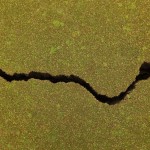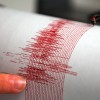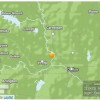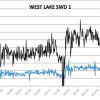Background
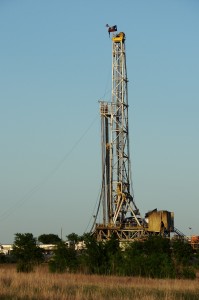
Photo by KUT News
This rig uses hydraulic fracturing to obtain gas from Texas' Barnett Shale formation. Photo courtesy of KUT News.
Does Fracking Cause Earthquakes?
Hydraulic fracturing, or “fracking,” (a drilling process that injects millions of gallons of water, sand and chemicals under high pressure into a well, cracking the rock and to release natural gas and oil) has only been known to rarely cause earthquakes.
But the disposal of drilling wastewater used in fracking has now been scientifically linked to earthquakes. The fluids used in fracking (and the wastewater that comes back up the well) is disposed of by injecting it into disposal wells deep underground. This is generally regarded as the safest, most cost-efficient way to get rid of it. But in some parts of the country, especially in the Barnett Shale area around Dallas-Fort Worth, it has also been causing earthquakes. And they’re growing both in number and strength.
How Fracking Disposal Wells Can Cause Earthquakes
The culprit of earthquakes near fracking sites is not believed to be the act of drilling and fracturing the shale itself, but rather the disposal wells. Disposal wells are the final resting place for used drilling fluid. These waste wells are located thousands of feet underground, encased in layers of concrete. They usually store the waste from several different wells.There are more than 50,000 disposal wells in Texas servicing more than 216,000 active drilling wells, according the the Railroad Commission. Each well uses about 4.5 million gallons of chemical-laced water, according to hydrolicfracturing.com.
“The model I use is called the air hockey table model,” says Cliff Frohlich, a research scientist at the Institute for Geophysics at the University of Texas at Austin. “You have an air hockey table, suppose you tilt it, if there’s no air on, the puck will just sit there. Gravity wants it to move but it doesn’t because there friction [with the table surface].”
But if you turn the air on for the air hockey table, the puck slips.
“Faults are the same,” he says. If you pump water in a fault, the fault can slip, causing an earthquake.
“Scientists in my community know that injection can sometimes cause earthquakes,” Frohlich says.
The science linking manmade earthquakes to the oil and gas industry isn’t anything new.
Decades ago, researchers even found they could turn earthquakes on and off by injecting liquid into the ground, says Dr. William Ellsworth with the Earthquake Science Center of the U.S. Geological Survey.
“This was seen as validation of the effective stress model,” he told StateImpact Texas. “This is work that was published in Science magazine and many other publications.”
Recent research has found definitive links between these disposal wells and earthquakes, particularly in Texas.
The quakes are linked to drilling in Barnett Shale. The productive portion of the Barnett Shale is located directly beneath Johnson, Tarrant and western Dallas counties, about a mile and a half underground. The shale contains an estimated 40 trillion cubic feet of natural gas, making it the largest onshore natural gas field in Texas and potentially in the United States.
A University of Texas at Austin from study last summer found a definitive link between earthquakes in the Dallas-Fort Worth area and disposal wells in the Barnett Shale.
And an earlier study by scientists at Southern Methodist University (SMU) and UT found links between disposal wells near the DFW airport and induced earthquakes for a series of quakes in 2008 and 2009. The study specifically looked at two injection wells in the area that were built in 2008. Seven weeks later, earthquakes started. “Were the DFW earthquakes natural or triggered by activities associated with natural gas production, most likely saltwater injection to dispose of brines?” the report asked. The study said yes, the “correlations are consistent with an induced or triggered source.”
The quakes studied from that two year period were all 3.0 magnitude or below, but in the years since there have been several quakes above 3.0 in the area, going as high as 3.5. There have been more than fifty earthquakes in the area since 2008.
It’s important to note that the earthquakes haven’t caused any reported significant damage. Generally an earthquake has to be magnitude 4.0 or higher to cause damage. But locals in the Dallas-Fort Worth area are disturbed and concerned about the trend of manmade seismic activity.
And there’s the open question of what kind of damage these induced quakes can do to drilling infrastructure. It’s plausible that the tremors could affect well integrity, Frohlich says. “In my business, you never say never. That said, most of the time these earthquakes are not right near the well. But it’s possible an earthquake could hurt a well,” he says, though he knows of no instances where that’s occurred.
It’s also important to note that there a tens of thousands of injection and disposal wells in Texas, yet only a few dozen of them are suspected of inducing quakes. It’s also true that disposal and injection wells have been known to induce seismic activity since the 1960s. What’s happening now is that with the rise of fracking, there is a need for more disposal wells. And in areas where fracking waste water is disposed of near population areas, it’s going to be noticed more.
Recent Earthquakes in Texas
South Texas experienced a magnitude 4.8 earthquake in Oct. 2011 near the Eagle Ford Shale Play, which is home to over 550 gas wells. There have been many other earthquakes linked to injection wells in the Dallas-Fort Worth area, over 50 since 2008. There were no earthquakes before then. The most recent quake was 3.0 magnitude on January 22, just outside the DFW airport. You can read about other recent quakes in the stories below.
And the quakes aren’t limited to Texas. Ohio experienced a magnitude 4.0 earthquake earlier this year near the town of Youngstown. The New York Times reported that Ohio officials believe this quake, the eleventh such event in Youngstown in 2011, was the result of disposal wells. Ohio stores much of Pennsylvania’s fracking waste in those wells.
Are the earthquakes getting bigger?
Art McGarr, of the US Geological Survey’s Earthquake Science Center, has been looking at whether the amount of fluid stored in a disposal well affects the strength of an earthquake. The question is that as wastewater stays in the disposal wells longer and more and more fluids are added, will the quakes become stronger?
His answer: they will.
“I think we’re at the point when, if you tell me that you want to inject a certain amount of waste water, for example a million cubic meters for a particular activity, I can tell you that the maximum magnitude is going to be five (on the rictor scale) or less. I emphasize or less,” McGarr said in a recent presentation.
The findings contradict the notion that the rate at which waste fluids are injected in a disposal well impacts the chance of quakes, but it raises another concern. If the findings are correct, they mean the longer a disposal well is injected with fluid, the greater the likelihood of a stronger quake. That means that older wells still in use across Texas and the rest of the country could be growing more and more prone to producing larger earthquakes.
“With time, as an injection activity continues, so will the seismic hazard as measured by the maximum magnitude,” said McGarr at the close of his presentation.
Fracking Can Cause Earthquakes, Too

Photo courtesy of Dr. Frohlich
Dr. Cliff Frohlich of the University of Texas at Austin is researching the links between fracking and earthquakes.
Dr. Cliff Frohlich, Associate Director of and Senior Research Scientist at the Institute of Geophysics at the University of Texas at Austin, says that while just a year ago he would have never said fracking itself causes earthquakes, now he thinks differently. “In the last year there have three well-documented earthquakes that occurred during the frack job and were probably related to fracking. They were all small earthquakes – of a magnitude of 2 or 3 – and, considering, that there are millions of frack jobs, fracking-related earthquakes are so rare,” he told StateImpact Texas.
“The last thing a frack engineer wants is to have the fluids go through a fault and go somewhere,” he said. “It’s like pouring water through a drain. So if you’re a frack engineer’s doing their job, they’re avoiding faults, and they’re trying to bust up area rather than having the fluids move somewhere. People injecting are less concerned about that. They’re trying to get rid of it, so they want a very porous material where fluids can flow away across long distances. So they’re more likely to get to a fault.”
Earthquakes directly linked to fracking have been rare. That hasn’t been the case with disposal wells used to get rid of fracking wastewater, however.
What Can Be Done to Prevent Drilling-Related Earthquakes?
Even if the earthquakes aren’t getting bigger, the growing scientific link between disposal wells and induced earthquakes has made many residents nervous. In response, some policymakers are searching for solutions.
A report out from the National Research Council referenced a nine year-old checklist of best practices for drillers and disposal well operators. That includes investigating the site’s history of earthquakes and its proximity to fault lines. But it included the observation that “government agencies and research institutions may not have sufficient resources to address unexpected (seismic) events.”
At a June 2012 Texas House Committee on Energy Resources hearing, state policymakers heard recommendations on what can be done to mitigate the risk of induced earthquakes. Melinda Taylor was one of the experts to give testimony. Taylor directs the Center for Global Energy, International Arbitration, & Environmental Law. She says other states have more safeguards in place against unwanted earthquakes.
In Ohio, for example, well operators need to do a “fairly detailed analysis of the geological conditions” before the state’s regulatory agency offers a permit to authorize a new disposal well. “So they can determine whether or not it’s likely to cause problems,” Taylor says.
What Can Texas Regulators Do?
Taylor also said the Texas Railroad Commission, which regulates oil and gas drilling in the state, may want to consider mandating setbacks, to ensure greater distance between disposal wells and public drinking water supplies, structures, and natural resources.
But as StateImpact Texas reported in January 2013, Texas regulators are largely ignoring the problem.
In a December 2012 forum hosted by the Texas Tribune, Railroad Commission Chair Barry Smitherman said he was aware of what he called “allegations” of a link between disposal wells and quakes.
“I know there are a number of studies being done and I think the University of Texas is doing one, and I’m anxious to see what kind of results we’re going to get,” he said in response to a question from StateImpact Texas. That study was released several months before, in August 2012.
That ‘wait and see’ approach is very close to the public position the Commission has taken previously. In an email to StateImpact Texas, Commission spokesperson Ramona Nye wrote that staff welcomes more data about “theories that hypothesize” a causation between seismic events and injection wells. But the Commission would not make any staff members available for interview.
To figure out how seriously the Commission was taking man-made earthquakes, StateImpact Texas filed open records requests for Commission emails relating to the subject.
The 111 pages of emails the Commission supplied show that staff members there accept what scientists and oilmen have known for decades: Injection wells can cause earthquakes. They even show staff members in communication with EPA researchers over certain quakes. The messages include forwards of media reporting on earthquakes and notes of concern from Texans.
Then the emails stop.
The last email about earthquakes that the Railroad Commission has on record was dated August 6, 2012. There was no record of electronic communication about the quakes that hit the Dallas area in late September, nor about quakes that hit North Texas in October, November or December.
The Railroad Commission is starting the process of writing new rules about disposal wells. But in an email to StateImpact Texas, the Commission said those proposed amendments “do not address seismic activity.”
Frolich, the UT expert on man-made earthquakes, had one last suggestion on how to mitigate unwanted quakes: find new ways of disposing drilling related wastewater.
“If disposal is causing earthquakes you can find a different way of dispose of it. You can dispose of the stuff in a different well, or you can even take it to a fluid treatment plant,” Frolich said.
Of course, companies’ willingness to do that will depend largely on cost and state regulation.
“The people involved in this [disposal well operation] are going to do the cheapest way of doing things that is generally considered safe,” said Frolich.
